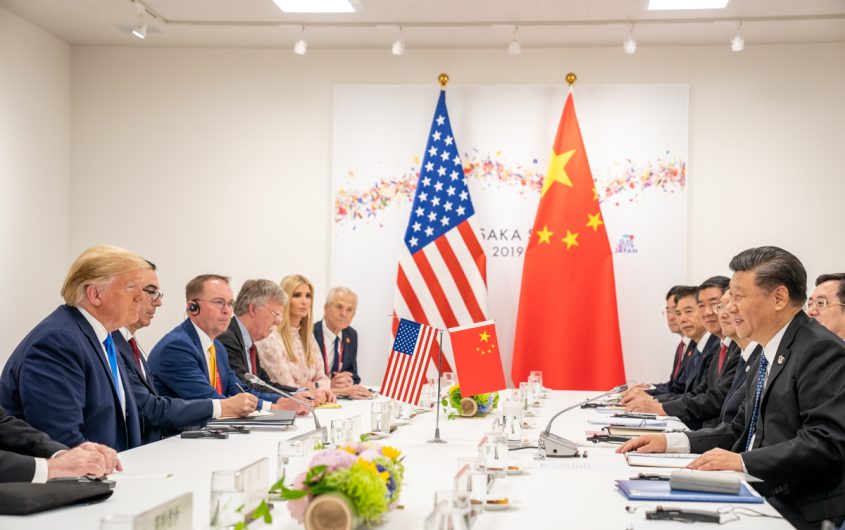
Official White House Photo by Shealah Craighead via Flickr
The Transatlantic Relationship Needs a New Organizing Principle on China

Yixiang Xu
China Fellow; Program Officer, Geoeconomics
Yixiang Xu is the China Fellow and Program Officer, Geoeconomics at AGI, leading the Institute’s work on U.S. and German relations with China. He has written extensively on Sino-EU and Sino-German relations, transatlantic cooperation on China policy, Sino-U.S. great power competition, China's Belt-and-Road Initiative and its implications for Germany and the U.S., Chinese engagement in Central and Eastern Europe, foreign investment screening, EU and U.S. strategies for global infrastructure investment, 5G supply chain and infrastructure security, and the future of Artificial Intelligence. His written contributions have been published by institutes including The Chinese Academy of Social Sciences, The United States Institute of Peace, and The Asia Society's Center for U.S.-China Relations. He has spoken on China's role in transatlantic relations at various seminars and international conferences in China, Germany, and the U.S.
Mr. Xu received his MA in International Political Economy from The Josef Korbel School of International Studies at The University of Denver and his BA in Linguistics and Classics from The University of Pittsburgh. He is an alumnus of the Bucerius Summer School on Global Governance, the Global Bridges European-American Young Leaders Conference, and the Brussels Forum's Young Professionals Summit. Mr. Xu also studied in China, Germany, Israel, Italy, and the UK and speaks Mandarin Chinese, German, and Russian.
__
After rounds of disappointing bilateral trade negotiations, the meeting between U.S. president Donald Trump and Chinese President Xi Jinping at the G20 summit in Osaka again offered a glimmer of hope for pulling the bilateral relationship back from brinkmanship. However, a protracted, wide-ranging conflict between the two countries seems imminent as the U.S. government extends its line of confrontation toward China from trade to technology to security. Growing rivalry between the two great powers is fast becoming a negative organizing principle of geopolitics whose secondary effects will have a profound impact on Europe and the transatlantic relationship.
A Choice between the U.S. and China
For the Europeans, the stakes are high in a new “Cold War” between the U.S. and China. Serious risks of global supply chain disruption are growing amid rising U.S.-China tariffs and export control measures. Even if the two countries could reach a truce on trade, Europe together with the rest of the world will bear the cost as global growth slows and companies are forced to price in the effects of economic decoupling. Competition in technology and innovation, increasingly viewed by Washington and Beijing through the prism of national security, could result in fragmentation of the internet, balkanization of global tech, and entrenchment of competing standards. But worst of all, Europe will be forced to choose sides.
Beijing’s promise of more bilateral trade and investment together with its self-professed commitment to multilateral institutions further buttress China’s appeal.
A U.S.-led world order has long meant stability and economic opportunity for allies. Rule-setting international organizations like the WTO are supposed to deliver that. But the Trump administration’s isolationist tendencies and indiscriminate transactional policy are undermining the structure of its long-term alliances and, in doing so, it is forcing U.S. allies to reexamine their options. For many, China is already an indispensable trade partner. Beijing’s promise of more bilateral trade and investment together with its self-professed commitment to multilateral institutions further buttress China’s appeal. But any hope of waiting out the Trump administration is an illusion. U.S. China policy has consistently enjoyed bipartisan support since 1972. The U.S. government’s current turn against China is also unlikely to change course even if there is a Democratic president in 2021.
As the U.S. ramps up pressure on allies to pull away from Beijing’s economic orbit, American assertion of national security concerns has proven inadequate at rallying European support. Only an unambiguous threat could persuade Europeans to cut their ties with China. But decoupling is the instigator rather than the solution for ensuing economic troubles. Nor do U.S. initiatives to curb Chinese security threats reassure European interests.
China as an Organizing Principle
Without an organizing principle, current U.S. China policy can often seem contradictory and European countries are encouraged to consider each U.S. action on its own merits. In the case of 5G infrastructure and WTO reform, a split of the United States from its European allies helps to create a more bilaterally organized international system in which China gains more bargaining power while the transatlantic partnership suffers. Thus, the transatlantic relationship urgently needs a new organizing principle on China, and it needs to have a balanced approach that builds on America’s traditional strength.
Without an organizing principle, current U.S. China policy can often seem contradictory and European countries are encouraged to consider each U.S. action on its own merits.
To start with, the Trump administration needs to concede that it alone is ill-equipped to deal with China’s challenge in areas such as technology innovation or cyberspace governance. Strategic responses to China’s global agenda are more effective when Europe and the U.S. pool their resources and present a unified front. The U.S. government has to stop working against its own strength from its large network of alliances around the world. Setting the rules of engagement in the age of artificial intelligence and cyber warfare requires a large group of liberal-minded countries to stand their ground on democratic values and human rights. Across Eurasia and in Asia-Pacific, Europe and the U.S. can complement each other’s infrastructure development and security efforts to create strong competition for China’s Belt-and-Road-Initiative (BRI). Instead of reinventing the wheel, the transatlantic partners should join efforts to improve existing multilateral institutions that have worked fairly well in maintaining an open, liberal, rule-based order.
An organizing principle on China needs to avoid artificially separating U.S.-China economic tensions and U.S.-China military tensions in an era of heightened geopolitical rivalry. Increasing the intersection of economic and security interests tempts both sides to reduce the Sino-U.S. relationship to a contentious theme, which risks rapid escalation further enhanced by new instruments of digital warfare. Europe in particular needs to come to terms with the reality of a drawn-out U.S.-China competition in multiple areas as well as its potentially instrumental role in maintaining cool-headed dialogues with Beijing and helping to find compromise on individual issues. These efforts will contribute to the process of creating new rules to manage great power competition.
A strategic approach to dealing with China in a globalized world also means finding ways to create trust. Engaging Beijing on global challenges both alleviates bilateral tensions with China and gains credibility for the liberal, democratic cause. This can be achieved by working together to deliver public goods by tackling a wide range of issues including climate change, nuclear nonproliferation, and pandemics. In an era of great power competition, the transatlantic relationship needs to adopt a long-term vision that employs strategic patience, emphasizes complementary partnership, and finds resilience in their shared values.









